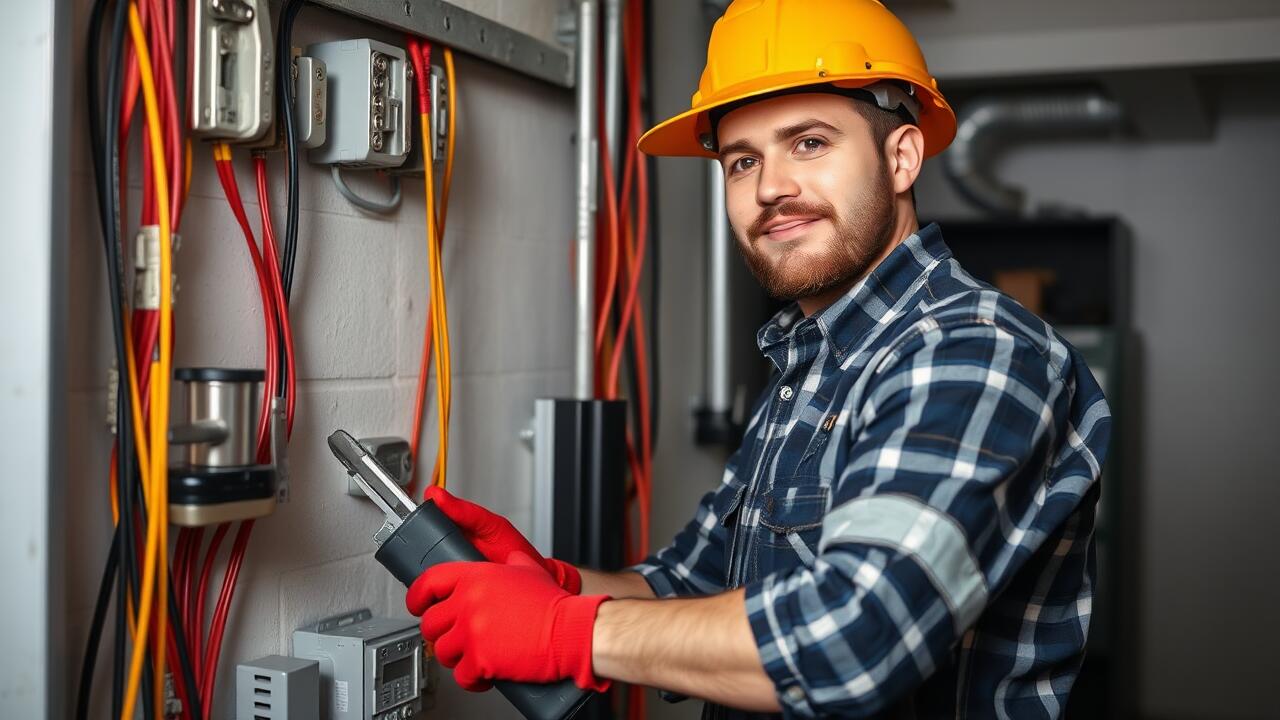
Wiring Problems
Wiring problems are among the most common culprits behind circuit breaker tripping in residential areas. Damaged or frayed wires can cause short circuits, leading to an overload of electrical current. Inadequate wiring may also fail to handle the power demands of modern appliances. This situation can create excessive heat, triggering the breaker to cut off the power for safety.
Homeowners should recognize the signs of wiring issues, such as flickering lights or frequent breaker trips. An inspection by a qualified professional is advisable to address these hazards effectively. For residents seeking assistance, contacting an Electrician Gulfton, Houston, can provide the expertise needed to evaluate and rectify wiring problems, ensuring a safe and efficient electrical system.
Recognizing Wiring Hazards
Wiring hazards in a home can lead to serious safety concerns. Signs of trouble include frayed wires, exposed wiring, or discoloration around outlets and switches. These indicators often suggest that there may be a risk of short circuits or electrical fires. Homeowners should be vigilant in inspecting their wiring and should never ignore unusual smells or frequent tripping of circuit breakers. When in doubt, it's best to consult a professional.
Professional electricians are trained to identify and address these issues effectively. An electrician can assess wiring conditions and recommend necessary repairs or upgrades. For residents in need of reliable assistance, Electrician Memorial, Houston, provides expert evaluation and solutions to prevent potential hazards. Investing in routine electrical inspections can help ensure a safe living environment while minimizing the risk of unexpected electrical failures.
Moisture and Water Damage
Moisture and water damage can significantly affect electrical systems within homes, leading to a range of problems including circuit breaker tripping. When water infiltrates electrical components, it can create short circuits or corrode wiring, compromising the safety and functionality of the system. This risk is especially prevalent in areas prone to flooding, leaks, or high humidity levels. Homeowners should be vigilant in monitoring their electrical systems for signs of moisture exposure, as this could indicate a need for repairs or upgrades.
The impact of water on electrical installations is not to be underestimated. Corrosion can develop over time, weakening the integrity of wiring and connections. It is crucial to address any water-related issues promptly to prevent further damage. Homeowners experiencing frequent circuit breaker trips related to moisture should consider consulting a professional. An electrician in Montrose, Houston can assess the situation accurately, recommend necessary repairs, and ensure the electrical system is safe and up to code.
Effects of Water on Electrical Systems
Water intrusion can have serious consequences on electrical systems within residential settings. Moisture can lead to corrosion of wiring and connections, compromising the integrity of the electrical infrastructure. This degradation may result in short circuits or even electrical fires. Understanding the signs of water exposure, such as discoloration or rust on outlets and fixtures, is essential for homeowners to prevent potential hazards.
In areas prone to flooding or excessive humidity, regular inspections are crucial for maintaining electrical safety. Homeowners should be alert to the impact that water damage can have on switches, outlets, and circuit breakers. Consulting a professional, like Electrician Memorial, Houston, is advisable when water issues are detected. This ensures a thorough evaluation and remediation, safeguarding both the family and the property from electrical malfunctions and dangers.
Outdated Electrical Systems
Aging wiring in residential areas often leads to significant safety risks. Circuits designed for older appliances may not handle modern electrical demands, which increases the likelihood of overheating and tripping circuit breakers. Homeowners may notice frequent disruptions in power, which can be disruptive and frustrating. If the wiring system has not been updated to meet current standards, it can compromise the efficiency of the entire electrical system.
When considering updates, homeowners should consult a qualified electrician. An expert can assess the current wiring and determine if it requires replacement or upgrades. Utilizing professionals such as Electrician Memorial, Houston, ensures that the integrity of electrical systems is maintained while adhering to local safety codes. Regular inspections and proactive maintenance can mitigate hazards associated with outdated systems, providing peace of mind for residents.
Risks of Aging Wiring
Aging wiring poses significant risks in residential areas. Insulation may deteriorate over time, leading to exposed wires that can cause short circuits or electrical fires. Corrosion can also develop in older systems, compromising connections and increasing resistance. These factors contribute to a higher likelihood of circuit breakers tripping, as they struggle to handle electrical loads effectively.
Homeowners should be vigilant about the condition of their electrical systems. Regular inspections by a qualified professional are essential to ensure safety and functionality. An Electrician Montrose, Houston, can provide valuable assessments and recommendations for updating or replacing outdated wiring. Proactive maintenance can prevent potential hazards and ensure a reliable electrical supply.
FAQS
What are the most common causes of circuit breaker tripping in residential areas?
The most common causes include wiring problems, moisture and water damage, and outdated electrical systems.
How can I recognize wiring hazards in my home?
Look for signs such as frequent circuit breaker tripping, flickering lights, burnt or frayed wires, and unusual odors coming from outlets or switches.
What effects does moisture have on electrical systems?
Moisture can cause corrosion, short circuits, and increased resistance, leading to circuit breaker tripping and potential safety hazards.
How can I tell if my electrical system is outdated?
Indicators include the age of your wiring (typically over 30 years), frequent breaker trips, not enough outlets for your needs, and reliance on fuses instead of circuit breakers.
What risks are associated with aging wiring?
Aging wiring can lead to overheating, electrical fires, and potential electrocution, making it essential to have it inspected and updated if necessary.




